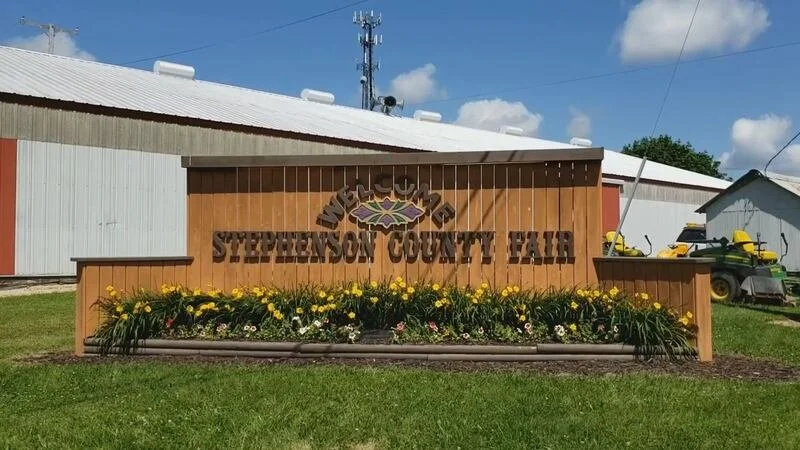County Fairs: A Tradition Worth Supporting Over Temporary Carnivals
FREEPORT, IL – July 11, 2025
County fairs are woven into the fabric of American life, representing a proud tradition of agriculture, community celebration, and economic impact dating back more than two centuries. Though many today associate fairs with funnel cakes, Ferris wheels, and grandstand concerts, their roots are deeply tied to education, youth development, and local economic vitality.
A Brief History
The concept of county fairs began in the early 19th century when agricultural societies organized gatherings for farmers to exhibit livestock, crops, and innovations in cultivation and husbandry. The first recorded American fair was held in 1811 in Pittsfield, Massachusetts, organized by Elkanah Watson to showcase local livestock and promote better farming practices.
By the mid-1800s, fairs spread across rural America, becoming annual events where farmers could gather, compete, and learn. Over time, these fairs added entertainment, carnival attractions, pageants, and parades to draw in the wider community, but at their core remained education, competition, and agricultural excellence.
The Good They Do for Communities
County fairs bring people together. They strengthen community ties by providing a place for families to gather, neighbors to connect, and local organizations to engage with the public. Volunteerism thrives at county fairs, with local leaders, parents, and service organizations staffing booths, running events, and maintaining fairgrounds.
For families, fairs are affordable and wholesome outings where children can experience rural life, farm animals, and educational exhibits—experiences that private traveling carnivals cannot replicate. While both provide entertainment, county fairs uniquely invest in the community’s growth and youth education rather than extracting profits for private operators.
Education and Youth Development
Perhaps the greatest impact of county fairs is in youth development. Programs like 4-H and FFA (Future Farmers of America) are staples at nearly every county fair. These organizations empower young people to raise livestock, master horticulture projects, and learn critical life skills such as responsibility, public speaking, and leadership.
Youth exhibitors spend months preparing their animals or projects, and competition teaches perseverance, good sportsmanship, and pride in achievement. Many adults who grew up showing at fairs credit these experiences for shaping their work ethic and community involvement. Private carnival events simply cannot provide this life-changing educational platform for youth.
The Money: What Fairs Historically Support
Beyond education and community spirit, county fairs are powerful economic engines. Revenue from admission fees, booth rentals, carnival contracts, and sponsorships supports:
Fairgrounds maintenance and improvements. Aging barns, exhibit halls, and arenas are updated to remain safe and attractive for visitors.
Youth programs. Premium payouts to 4-H and FFA exhibitors reward hard work and help fund future projects or college savings.
Agricultural societies and extension programs. Profits sustain educational outreach, soil and water conservation initiatives, and local agricultural research efforts.
Local economies. Vendors, entertainers, security, and food providers benefit directly. Visitors spend money in nearby restaurants, gas stations, and shops, infusing rural economies with critical seasonal income.
In contrast, privately sponsored carnivals typically funnel their profits out of the community, supporting no youth programs or fairground upkeep, leaving behind little more than tire tracks and empty lots.
Stephenson County Fair — Freeport, IL (July 22–26, 2025)
The Stephenson County Fair returns this year at the Stephenson County Fairgrounds (2250 S Walnut Rd, Freeport, IL) from Tuesday, July 22 through Saturday, July 26, 2025 (stephensoncountyfair.org).
Admission is $10 per person—and now includes grandstand access to features like Tractor & Truck Pulls, Tough Truck Challenge, Concerts, and the Demolition Derby, with no additional fees.
Why Your Support Matters More Than Ever
When you buy a ticket to your county fair, purchase food from a local vendor, sponsor a livestock class, or simply show up to applaud young exhibitors, you are investing in your community’s future.
Your support:
Empowers youth to gain skills, confidence, and purpose through programs like 4-H and FFA.
Strengthens local businesses by keeping dollars circulating within the county rather than leaving with an out-of-town carnival.
Preserves traditions that teach respect for agriculture, trades, and community cooperation.
Builds community pride by keeping fairs thriving, maintained, and accessible for future generations.
A Call to Action
As fair season arrives, consider where your money goes. Attending your county fair isn’t just entertainment—it’s an investment in local youth, agriculture, and economic stability. Bring your family, volunteer if you can, and support the vendors, students, and farmers who make it possible. These fairs are more than fleeting amusement—they are celebrations of who we are, what we grow, and what we can achieve together.
If we want strong communities tomorrow, we must support the institutions that build them today. County fairs are one of those institutions.
Learn more, volunteer, or sponsor this year’s Stephenson County Fair at www.stephensoncountyfair.org.
—Brought to you and Paid for by Fighting4Freeport






